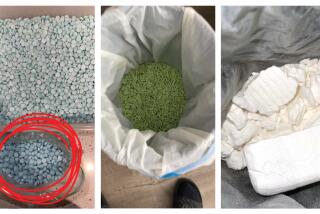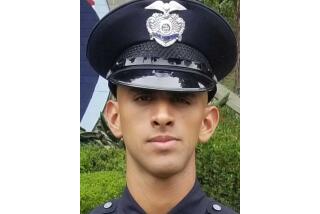3 Guilty in Death of Informant, 17
- Share via
A jury Monday convicted two men and a woman of torturing and murdering teenage police informant Chad MacDonald, capping a nearly two-year case that prompted a new state law restricting the use of youths in undercover police work.
Defendants Michael Martinez, 21, Florence Noriega, 28, and Jose Ibarra, 19, face the death penalty at the next phase of the trial, scheduled to continue next month in Los Angeles County Superior Court in Norwalk. The jury will decide if the defendants deserve to die for the murder, which occurred after they kidnapped and robbed MacDonald, 17, of Yorba Linda.
The three, all from Norwalk, were convicted of beating and strangling MacDonald in March 1998, then dumping his body in a South Los Angeles alley. They also were convicted of kidnapping, robbing and attempting to murder MacDonald’s 16-year-old girlfriend. She was raped, shot and left for dead in Angeles National Forest, but survived and provided key testimony at the trial. Noriega and Ibarra were found guilty of raping her; Martinez was acquitted on that charge.
MacDonald’s relatives, including his mother, Cindy, expressed satisfaction with the verdicts. At one point, the victim’s uncle, Chris Saroli, smiled approvingly at the jury. “I think everyone in the courtroom realized they were guilty,” he said.
Cindy MacDonald, struggling to hold back tears, said the jury’s decision lifted a weight from her.
“I am very relieved,” she said. “I think the jury did an excellent job. They had a lot to ponder.”
The verdicts, which took more than 20 minutes to read in a packed courtroom, prompted little reaction from the defendants.
Martinez, a short man with a wispy mustache, broke into a slight smile. Noriega, her long hair draped over her shoulders, sighed slightly and thrust back in her chair. The short, pudgy-faced Ibarra coughed, then shifted in his seat. His ears reddened when the clerk read the first-degree murder conviction.
Attorneys for the defendants argued that the three did not intend to kill MacDonald. Richard Leonard, Martinez’s attorney, said that the murder convictions were expected and that the real court battle lies ahead.
“What this case is all about is whether they get death or life without parole,” Leonard said.
The case proved to be far more than a murder trial. It led to broad condemnation of the Brea Police Department. A new state law requires police to get permission from a judge before using youths ages 13 through 17 as informants. It also led Cindy MacDonald to file a $10-million wrongful death lawsuit against the cities of Brea and Yorba Linda, which is pending.
The murder occurred after MacDonald went with his girlfriend to visit a ramshackle drug house on Halcourt Avenue in Norwalk. MacDonald had agreed to work as an informant for the Brea police after he was arrested in January 1998 on charges of methamphetamine possession.
Brea police officials have said the teenager worked as an informant only once--on a drug buy--and had stopped working for them weeks before the murder.
To MacDonald’s killers, however, he apparently was a snitch who needed to be taught a lesson.
At the trial, Ibarra’s defense attorney, Forrest Latiner, described MacDonald as “a 112-pound weakling with a toxic level of meth in his system” who died from what his attackers meant to be a nonfatal beating.
In powerful testimony early in the trial, the girlfriend said Noriega accused them of being police informants; then the group bound and beat them. She said Noriega, referring to her, told the men at one point: “She’ll take five bullets, so load it all the way up.”
The girl, whose identity was not released, was raped, shot in the face and left in a culvert near the San Gabriel Reservoir. MacDonald’s battered and strangled body was found in an alley six days later.
Family members would not say if they wanted the jury to return death sentences. Saroli, Cindy MacDonald’s brother, suggested that anything the jury decided would be satisfactory.
“Whatever the Lord above wants, that’s what we want,” he said.
*
Times staff writer Hudson Sangree contributed to this story.
More to Read
Sign up for Essential California
The most important California stories and recommendations in your inbox every morning.
You may occasionally receive promotional content from the Los Angeles Times.














